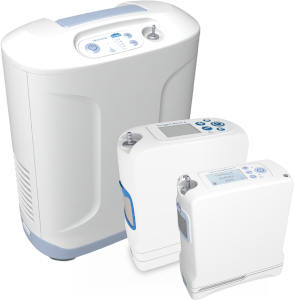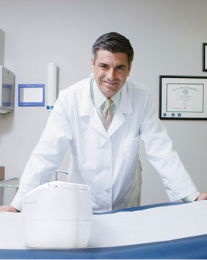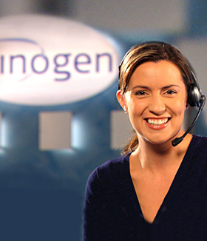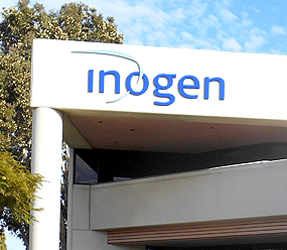When you are trying to understand the difference between COPD and emphysema, it can be a little confusing. At times, people use the terms interchangeably, while at other times, the two diseases are treated as separate ailments. If you have ever found yourself researching, “What is the difference between COPD and emphysema?” you may have come away unclear about the answer. Read on to get a better understanding of emphysema vs. COPD, as well as understanding how COPD and emphysema can differ.
Difference Between COPD & Emphysema
To truly clarify, “What is the difference between COPD and emphysema?” it is important to understand that chronic obstructive pulmonary disease, or COPD, is a term describing a group of progressive lung diseases that all cause worsening breathlessness. COPD can include a number of different lung diseases that, together, make it difficult for air to move easily in and out of the airways, including chronic bronchitis, asthma and emphysema. So, if you have been diagnosed with COPD, you may or may not have emphysema.[1]
Emphysema, on the other hand, describes a very specific lung disease. With emphysema, the walls of the air sacs in the lungs are destroyed, which causes them to collapse. This creates one large area that holds air, rather than many small spaces, thereby reducing the surface area within the lungs that can absorb oxygen. This means your lungs are less efficient at absorbing oxygen, so less oxygen makes it to your bloodstream. The damage to the lungs’ air sacs also means that the lungs are less efficient at exhaling fully, which means air can get stuck inside the lungs. This also reduces the amount of air you are able to inhale on your next breath, which means even less oxygen gets to your bloodstream. If you are diagnosed with emphysema, you have also been diagnosed with COPD, since emphysema is one of the diseases that falls under the COPD diagnosis.[1]
In short, COPD is the overarching umbrella term for a group of diseases that damages your lungs and causes increasing breathlessness, emphysema is one of the diseases that falls under that umbrella. If you have emphysema, you also have COPD; however, a COPD diagnosis might not include emphysema.
COPD Emphysema Symptoms
Because emphysema is a type of COPD, they share similar outward symptoms. These symptoms can take time to appear and may only occur after significant damage to the lungs. A doctor cannot diagnose the type of COPD a person has on the basis of symptoms alone. Typically, a person will notice the first symptoms of COPD or emphysema during physical activity. A person with one, or both, of these conditions may experience:
- shortness of breath
- tightness in the chest
- wheezing or a whistling sound in the chest
- a chronic cough that may produce clear, white, yellow, or green mucus
- blue lips or nail beds
- frequent colds or respiratory infections
- lack of energy
- unexplained weight loss
- swelling in the lower extremities
Symptoms tend to worsen over time, especially if a person continues their exposure to smoke or other irritants, so catching and treating them as early as possible is key to successful treatment.[1]
How to Improve Your COPD Emphysema Symptoms
There’s no direct cure for emphysema once the lung damage is done, but treatments can relieve symptoms and prevent further lung damage. People with emphysema who smoke should quit smoking immediately. After you’ve quit smoking, there are several treatments available for emphysema. Your doctor may choose a combination of treatments for the best results. Most often, your doctor will prescribe medications, such as bronchodilators, inhaled steroids or antibiotics to help you breathe easier. They are likely to recommend pulmonary rehabilitation and nutrition training along with lifestyle changes such as quitting smoking, a regular exercise routine, protecting yourself from the cold and avoiding respiratory irritants, like fumes, strong odors and burning candles. If you have severe emphysema with low blood oxygen levels, using oxygen regularly at home and when you exercise may provide some relief. Many people use oxygen 24 hours a day. It’s usually administered using a nasal cannula or mask. Oxygen therapy can be used in conjunction with pulmonary rehab or medication to help improve your oxygen saturation and help you breathe better, particularly during physical activity. [2]
If your doctor recommends oxygen therapy, there are a number of delivery systems available. However, portable oxygen concentrators, like those from Inogen, allow you to receive your oxygen treatments at home or on the go. As long as your battery is charged or you have power access, you will have an endless supply of supplemental oxygen.[3] Even better, our portable oxygen concentrators weigh between 2.8 and 4.8 pounds and are designed for your on-the-go lifestyle. Talk to your doctor about whether a portable oxygen concentrator is right for treating your COPD and emphysema symptoms, and contact Inogen today to find out more about how our products can provide a lightweight option for portable oxygen.
FREQUENTLY ASKED QUESTIONS: EMPHYSEMA VS. COPD
CAN YOUR LUNGS HEAL FROM EMPHYSEMA?
Unfortunately, there is no cure for emphysema and you cannot reverse existing lung damage. Your lung damage and your symptoms will continue to worsen without treatment.[1] However, there are many treatments that can help treat and improve symptoms, slow the progression of your disease and prevent additional lung damage. Depending on the severity of your emphysema, your doctor may suggest medications, oxygen therapy, pulmonary rehabilitation, diet and lifestyle changes or even surgery to help treat your disease.[2] If you have emphysema, talk to your doctor about the best course of treatment for your COPD emphysema symptoms.
HOW LONG CAN YOU LIVE AFTER BEING DIAGNOSED WITH EMPHYSEMA?
Your life expectancy with emphysema depends on a number of different factors, but smoking is the number one factor. If you do not quit smoking, your emphysema (and any associated lung damage) will continue to progress and your symptoms will worsen.[1] Continuing to smoke can shorten your life expectancy by 10 years or more. After that, the stage of your emphysema makes a difference. Quitting smoking before the age of 40 reduces the risk of dying from smoking-related disease by about 90%.[4] Emphysema gets worse over time, and it affects everyone differently. That means there’s no way doctors can know for sure who long you can expect to live if you have it. Your doctor will use information about the stage of your disease to come up with the best treatment plan for your special case.
DOES EXERCISE HELP EMPHYSEMA OR COPD?
Though it may surprise you, exercise is an essential part of maintaining your respiratory health, even with COPD and emphysema. Exercise helps improve your circulation, which can help with your body’s oxygenation. It also helps keep your lungs and airways as elastic as possible and in good shape, which ultimately helps you breathe easier. Talk to your doctor about what kind of moderate exercise is best for you, but generally speaking, a daily walk, swimming session or bike ride are great options. Stretching and resistance training are also helpful and can help keep your muscles as strong and flexible as possible. If you feel short of breath during regular exercise, talk to your doctor about what you should do to improve your endurance. You may need to adjust how you exercise or incorporate oxygen therapy into your exercise routine.[5]
HOW FAST DOES EMPHYSEMA PROGRESS?
Emphysema usually progresses slowly and the majority of patients do not notice the changes in their breathing. Some patients do experience a faster onset of symptoms, though that is less common. Generally speaking, the amount a patient currently smokes, their smoking history, their long-term exposure to lung irritants and their genetics, along with their overall health, plays a large part in how quickly the disease progresses.[1]
CITED SOURCES
- “COPD versus Emphysema: What Are the Differences?” Medical News Today, MediLexicon International, www.medicalnewstoday.com/articles/314803.php.
- “Emphysema.” Mayo Clinic, Mayo Foundation for Medical Education and Research, 28 Apr. 2017, https://www.mayoclinic.org/diseases-conditions/emphysema/ diagnosis-treatment/drc-20355561
- Supplemental Oxygen Therapy: Types, Benefits & Complications (clevelandclinic.org) https://my.clevelandclinic.org/health/treatments/23194-oxygen-therapy
- Tobacco-Related Mortality | CDC
- Physical Activity and COPD.” American Lung Association, Apr. 2020, www.lung.org/lung-health-diseases/lung-disease-lookup/copd/living-with-copd/physical- activity“.
ADDITIONAL SOURCES
- Harvard Health Publishing. “Emphysema.” Harvard Health, Harvard Health Publishing, March 2019, https://www.health.harvard.edu/a_to_z/emphysema-a-to-z.
- Understanding Emphysema Treatments. Healthline, www.healthline.com/health/copd/emphysema-treatment-options.









